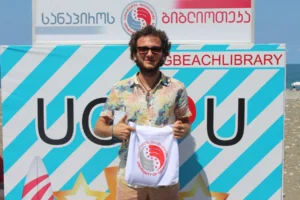
Why Choose University of Georgia for Medical Doctor(MBBS/ MD) Program?
Imagine embarking on a medical journey that combines world-class education, state-of-the-art facilities, and a vibrant multicultural environment—all set in the historic and scenic city of Tbilisi. This dream can become a reality with Study Georgia, your dedicated educational consultant and official representative of the University of Georgia. Choosing the University of Georgia for your MBBS/MD program opens doors to unparalleled academic excellence, practical experience, and global career opportunities. Let us guide you through why the University of Georgia is the ideal destination for aspiring
medical professionals.
Introduction
The University of Georgia, located in the vibrant city of Tbilisi, is a beacon of higher education in the region. Known for its comprehensive programs and state-of-the-art facilities, it attracts students from all over the world. Among its diverse offerings, the MBBS/MD program stands out as a premier choice for aspiring medical professionals. This single-cycle degree program, conducted in English, provides an extensive and immersive medical education experience. In this blog, we will delve into why the University of Georgia is an excellent choice for pursuing an MBBS/MD, exploring the program’s structure, requirements, goals, teaching methods, and learning outcomes.
Program Overview
Program Name: Medicine (MBBS/MD)
● Study Level: Single-Cycle Degree Program
● Study Language: English
● Program Permission: English language proficiency (B2 level) and
other legislative requirements.
Admission Requirements
To enroll in the MBBS/MD program, applicants must demonstrate English proficiency at a B2 level. This can be verified through standardized tests or a university-conducted exam with a minimum threshold of 60%. Additionally, applicants must pass an admission exam/interview covering Biology, Chemistry, and Physics. Foreign high-school graduates who have studied abroad for the last two years or more, or those currently studying in recognized higher educational institutions abroad, can enter the program without passing the Uniform Unified National Entrance Examinations.
Why Choose the University of Georgia?
1. Comprehensive and Well-Structured Curriculum
The MBBS/MD program at the University of Georgia is designed to provide a holistic medical education. It combines theoretical knowledge with practical skills, ensuring that students are well-prepared for the demands of the medical profession. The program aligns with the TUNING/MEDINE project objectives, ensuring that graduates meet international standards.
2. Experienced Faculty and Modern Infrastructure
The University of Georgia boasts a team of highly qualified, experienced, and creative professionals dedicated to providing top-notch medical education. The university’s modern infrastructure, including advanced laboratories and clinical simulation centers, supports a conducive learning environment.
3. Multicultural Environment
The university prides itself on its diverse community, fostering cross-cultural awareness and understanding. This multicultural environment enriches the learning experience, preparing students to work in various global settings.
4. Superior Employment Prospects
Graduates of the University of Georgia benefit from excellent employment prospects. The university’s strong reputation, rigorous training, and comprehensive curriculum make its graduates highly sought after in the medical field.
5. Focus on Practical Skills
The program emphasizes practical skills through clinical rotations, simulation-based training, and hands-on experiences. This practical approach ensures that students are not only knowledgeable but also skilled in applying their knowledge in real-world medical scenarios.
Program Goals
The primary aim of the MBBS/MD program is to prepare competent, compassionate, and skilled medical doctors. The program is designed to ensure that graduates possess the necessary theoretical knowledge,
practical skills, and values required to excel in the medical field.
Key goals include:
● Continuing Medical Education: Preparing graduates to successfully continue their medical education through Masters and Doctoral programs.
● Clinical Positions: Equipping graduates with the skills to apply for clinical positions as junior doctors.
● Scientific and Academic Activities: Encouraging participation in scientific and academic activities in Georgia and internationally.
● Continuous Improvement: Instilling a commitment to continuous improvement of knowledge and skills.
● Health and Wellbeing: Contributing to the improvement of health and wellbeing of local and global communities.
Methods for Attaining Learning Outcomes
The MBBS/MD program employs a variety of teaching methods to ensure comprehensive learning outcomes. These methods include:
● Lectures and Interactive Seminars: Providing foundational knowledge through structured lectures and interactive discussions.
● Problem-Based Learning (PBL) and Case-Based Learning (CBL): Engaging students in solving real-world medical problems and cases.
● Practical Training: Offering hands-on experience through simulations, role-playing, and clinical rotations.
● Communication with Patients: Developing communication skills through interactions with standardized patients.
● Team Work: Encouraging collaboration and teamwork through group projects and exercises.
Learning Outcomes
The MBBS/MD program is designed to achieve the following learning outcomes:
Knowledge and Understanding
● Biomedical Sciences: Deep and systematic knowledge of biomedical sciences.
● Behavioral and Social Sciences: Understanding basic principles and processes.
● Clinical Sciences: Broad knowledge of various medical specialties and subspecialties.
● Medicines: Understanding the principles of prescribing medicines.
● Public Health: Knowledge of disease prevention, health promotion, and global health issues.
● Ethical and Legal Principles: Understanding ethical and legal aspects of medical practice.
● Healthcare Organization: Knowledge of healthcare systems and the physician’s role within these systems.
Skills
● Consultation: Ability to carry out patient consultations.
● Clinical Assessments: Competence in assessing clinical presentations and making diagnoses.
● First Aid: Proficiency in providing first aid and resuscitation.
● Drug Prescription: Skills in prescribing medications.
● Practical Procedures: Ability to conduct practical medical procedures.
● Effective Communication: Communicating effectively in a medical context.
● Ethical Practice: Applying ethical and legal principles in medical practice.
● Psychological and Social Evaluation: Evaluating psychological and social aspects of patients’ diseases.
● Evidence-Based Practice: Using evidence-based knowledge in medical practice.
● Information Technology: Utilizing information technology effectively.
● Scientific Principles: Applying scientific principles to medical practice and research.
● Public Health Engagement: Participating in health promotion and public healthcare initiatives.
Responsibility and Autonomy
● Lifelong Learning: Commitment to continuous professional development.
● Ethical Practice: Adherence to ethical principles and patient rights.
● Conflict Resolution: Ability to resolve conflicts in a professional context.
● Professional Relationships: Establishing relationships based on equality and liberal values.
Teaching Process Characteristics
The teaching process in the MBBS/MD program is characterized by a blend of theoretical, laboratory, and practical training.
Key features include:
● Theoretical Lectures: Concurrently conducted in multiple groups.
● Clinical Rotations: Intensive teaching organized in university and affiliated medical institutions.
● Small Group Learning: Laboratory and practical groups with no more than 15 students.
● Mentor System: Practical training conducted using a mentor system.
● Simulation Training: Use of structured evaluation systems in simulation and clinical settings.
● Georgian Language Requirement: International students must choose a Georgian language subject to enhance their communication skills.
Conclusion
Choosing the right medical school is a critical decision that shapes your future as a healthcare professional. The University of Georgia’s MBBS/MD program offers a comprehensive and immersive medical education experience, standing out as a beacon of excellence. With its rigorous curriculum, experienced faculty, modern infrastructure, and focus on practical skills, the program prepares students to excel in the medical field. The multicultural environment and superior employment prospects further enhance the attractiveness of this program. By choosing the University of Georgia for their MBBS/MD studies, students are investing in a future of excellence, compassion, and professional success.
As the official representative of this prestigious institution, Study Georgia is here to ensure your journey is smooth and successful. From navigating the admission process to settling into life in Tbilisi, we are committed to supporting your aspirations every step of the way. Join us and take the first step towards a fulfilling and impactful medical career with the University of Georgia.


